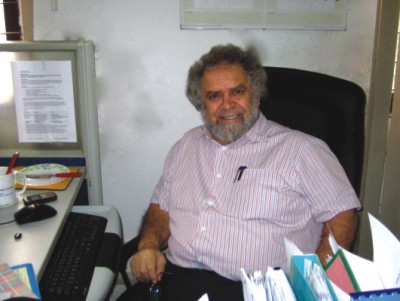| Tribute
Still Here in Spirit
Andrew Morris
 Perhaps it was because of his own relatively humble beginnings that Ross felt so passionately about the value and the goals of education. He grew up in a working-class family, going to school barefoot in the post-war period in New Zealand, when standards of living were low. Perhaps it was because of his own relatively humble beginnings that Ross felt so passionately about the value and the goals of education. He grew up in a working-class family, going to school barefoot in the post-war period in New Zealand, when standards of living were low.
In the 1950s the Labour government brought in many social reforms, including compulsory secondary education and support for tertiary, which for the first time allowed everyone the chance to improve their lot, an opportunity which Ross seized with both hands. As well as being an outstanding sportsman at school, he specialised in science, going on to become first a teacher, then a trainer, then Dean of the School of Education at Christchurch University.
It was while there that he first worked with a number of teacher educators from Bangladesh, and that a long and profound connection developed, resulting in many friendships which have lasted till this day. Initially coming on short-term visits, interspersed with work throughout Asia and the Pacific, he arrived in 2006 for his current long-term post as a teacher training consultant on the national Teaching Quality Improvement project, a role which not only involved him in national decisions concerning curriculum and training policy but also took him on visits to the remotest corners of Bangladesh.
We first collaborated professionally in 2003, but it was not until I joined this project that I had the privilege of working full-time alongside him, sitting opposite him each day and enjoying conversations on matters from teaching techniques to Gaza and from national examinations to the beauty of New Zealand, for which he was a one-man advertising agency. And it was especially through this long-term co-operation that I had the chance to get to know this remarkable and visionary man.
In professional terms he was absolutely tireless, devoted to his work and more importantly to the wider cause of education in Bangladesh. Few consultants have had such a profound understanding of the entire education system here, such a passion for helping things change and develop, and such affectionate relationships with practitioners across the country, from classroom teachers to teacher educators to senior ministry figures. He had a combination of wisdom, diplomacy, patience and natural warmth which is extremely rare, coupled with a refusal to give up, even in the face of occasionally obtuse resistance from technocrats. Where lesser consultants, myself included, were tempted occasionally to abandon the chase and accept defeat, Ross went on fighting to the last.
But it was his personal qualities which made him a truly extraordinary colleague. To anyone who came into contact with him, and especially to those of us lucky enough to work closely with him, he was an outstanding role model. Always informative, supportive, understanding, whether the problems were pedagogical, practical or emotional. A superb leader, he knew how to motivate the team, dropping in a personal comment to each colleague as and when the occasion arose, so that everyone felt appreciated and valued. And a genuine lifelong learner: even the simplest journey to work in the morning was peppered with commentary from Ross as he took an almost childlike interest in anything and everything happening on the streets outside.
He was a marvelous raconteur, often enthusing about his future plans for a house and a boat for his envisioned long retirement in New Zealand. But in fact he had a story for every possible occasion: he could quite easily have captained the New Zealand Talking Team. One of his very favourite topics was his family, of whom he was always immensely proud, from his wife Gillian, also a successful education consultant here in Bangladesh, to his two children. His devotion was such that he once struggled through a thousand-page book on imperial Japan simply because it was a topic that interested his son and he wanted to share in the enthusiasm. A sentimental old softie, Ross' eyes would often well up with tears when talking of their achievements. It is for this passion and this selflessness that he will be most remembered. For his huge heart, which in the end gave so much to everyone else that it gave out on him.
After the initial shock, the numb incredulity, the unstoppable tears, when someone this close to you passes away, there is the slow journey towards thanksgiving, to celebration of what they brought, and to the determination to honour them by striving to embody their values and their attitudes in your own life.
Ross's passing is a clear reminder that the legacy we leave goes way beyond our professional achievements. In fact it has little to do with reports written, projects completed or annual operation plans drafted, but is something much more profoundly human. His real impact has been on the hearts and minds of thousands of colleagues and students worldwide who've been inspired by his example and warmth, people to whose attitudes, motivation and self-respect he made a deep, positive and lasting difference. On that score, Ross Tasker will live on in spirit both here and in many other countries in for decades to come.
Goodbye Ross. We all miss you. Rest in peace.
Copyright (R) thedailystar.net 2009 |
